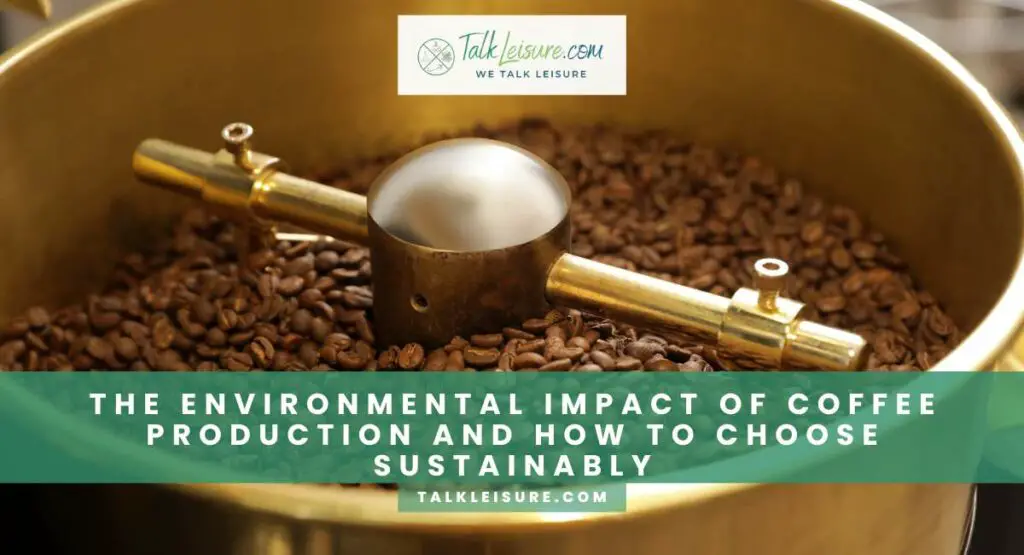Coffee is one of the most popular beverages in the world.
It is estimated that over 2.25 billion cups of coffee are consumed worldwide each day.
However, the environmental impact of coffee production is a growing concern.
The coffee industry is known to have a significant impact on the environment, particularly in terms of deforestation, soil degradation, water pollution, and greenhouse gas emissions.
Importance Of Choosing Sustainably Produced Coffee

Sustainably produced coffee is grown and processed to minimize its environmental impact while ensuring the economic and social well-being of farmers and their communities.
The importance of choosing sustainably produced coffee includes:
- Environmental conservation: Sustainably produced coffee promotes the preservation of natural resources such as forests, soil, and water and helps to protect wildlife habitats.
- Climate change mitigation: Sustainably produced coffee helps reduce greenhouse gas emissions by minimizing energy use in coffee processing and transportation.
- Social responsibility: The production of sustainably produced coffee provides a fair income to farmers and supports their communities.
- Health benefits: Sustainably produced coffee is often grown without the use of harmful chemicals, making it a healthier choice for consumers.
The Environmental Impact Of Coffee Production

Coffee is one of the most popular beverages in the world, with over 2.25 billion cups consumed daily.
However, the environmental impact of coffee production has been a growing concern.
The coffee industry’s environmental impact is significant, with activities such as deforestation, water pollution, soil degradation, and greenhouse gas emissions.
Deforestation and Habitat Loss
Coffee is grown in tropical regions that are often rich in biodiversity and home to various wildlife species.
However, clearing land for coffee plantations contributes to deforestation and habitat loss.
This loss results in soil erosion, decreased biodiversity, and the displacement of wildlife populations.
Water Consumption And Pollution
Coffee production is water-intensive, with approximately 140 liters of water required to produce one cup of coffee.
Additionally, chemical fertilizers, pesticides, and other pollutants used in coffee farming can contaminate water sources, resulting in water pollution.
This pollution harms aquatic life and poses a threat to human health.
Chemical Use and Soil Degradation
Coffee farming often involves using chemical fertilizers and pesticides to maximize yields.
However, these chemicals lead to soil degradation and erosion, resulting in a loss of soil fertility and reduced crop yields.
Furthermore, the overuse of chemicals can have long-term effects on the soil, making it unsuitable for agricultural use.
To mitigate these environmental impacts, it is crucial to choose sustainably produced coffee.
Sustainably produced coffee is grown and processed to minimize harm to the environment while supporting the well-being of coffee farmers and their communities.
How To Choose Sustainably Produced Coffee

Coffee consumption has become a daily ritual for many people worldwide.
Considering the significant environmental impact caused by coffee production, there is a growing need to transition towards sustainable coffee production to preserve natural resources while supporting coffee farming communities.
Organic Certification And Labeling
Organic certification indicates the coffee has been grown using natural methods without synthetic pesticides, herbicides, or fertilizers.
Organic coffee farming promotes soil health and biodiversity, producing coffee that is free from harmful chemicals.
Consumers can look for the “organic” label or certification when purchasing coffee to ensure they are supporting environmentally friendly coffee producers.
Fair Trade Certification And Direct Trade Practices
Fairtrade certification ensures that coffee farmers are paid fairly for their products, allowing them to support their families and communities while also covering their production costs.
Direct trade practices further ensure that farmers receive a fair price for their coffee by eliminating intermediaries in the supply chain.
Consumers can look for the “fair trade” label when purchasing coffee to ensure they are supporting ethical and sustainable coffee production.
Shade-Grown And Bird-Friendly Certifications
Shade-grown coffee is grown under a canopy of trees, providing habitat for wildlife and promoting biodiversity.
Similarly, bird-friendly coffee is grown under a canopy of trees, preserving bird habitats and promoting sustainable farming practices.
These certifications promote sustainable practices that benefit the environment and coffee farming communities.
Consumers can look for these certifications when purchasing coffee to ensure they are supporting sustainable and environmentally friendly coffee production.
It is essential to support sustainable coffee producers and prioritize environmentally-friendly coffee production.
By choosing sustainably produced coffee and looking for certifications such as “organic,” “fair trade,” “shade-grown,” or “bird-friendly,” consumers can make a positive impact on the environment while supporting coffee farming communities.
Moreover, they can contribute to mitigating the environmental impacts caused by coffee production, such as deforestation, water pollution, and soil degradation.
Packaging and Waste Reduction
Coffee packaging and waste have a significant impact on the environment.
Consumers can choose sustainably produced coffee with eco-friendly packaging and practices to reduce this impact.
Here are some ways to choose environmentally friendly coffee packaging and reduce waste.
Sustainable Packaging Options For Coffee
Coffee packaging can have a significant environmental impact due to its non-recyclable components.
However, some coffee producers offer eco-friendly packaging options such as biodegradable or compostable bags, reusable containers, or recyclable metal or glass containers.
Consumers can look for these packaging options when purchasing coffee to reduce packaging waste and its impact on the environment.
Reusable And Compostable Coffee Filters
Disposable coffee filters also contribute to waste.
Consumers can choose reusable coffee filters made of stainless steel, metal mesh, or cloth, reducing waste generated.
Additionally, compostable coffee filters made from natural fibers can be a good alternative for those who prefer disposable filters.
Consumers can dispose of them in a compost bin, reducing their environmental impact.
Reducing Coffee Waste
Coffee waste is another significant environmental concern.
Consumers can reduce coffee waste by only brewing the amount they will consume, avoiding over-brewing, and choosing high-quality beans.
Additionally, leftover coffee grounds can be used for composting or gardening, reducing food waste and providing natural fertilizer for plants.
Conclusion
Coffee packaging and waste have a significant impact on the environment.
Consumers can choose sustainably produced coffee with eco-friendly packaging and practices to minimize their environmental impact.
Sustainable packaging options for coffee include biodegradable or compostable bags, reusable containers, or recyclable metal or glass containers.
Choosing reusable and compostable filters can reduce the amount of coffee waste.
Consumers can also reduce coffee waste by only brewing the amount they will consume, avoiding over-brewing, and choosing high-quality beans.
Leftover coffee grounds can be used for composting and gardening, providing natural fertilizer for plants.
By considering environmentally friendly coffee consumption habits, consumers can positively impact the planet while enjoying their daily cup of coffee.
More Articles: A barista’s guide to latte art: Tips and tricks.






